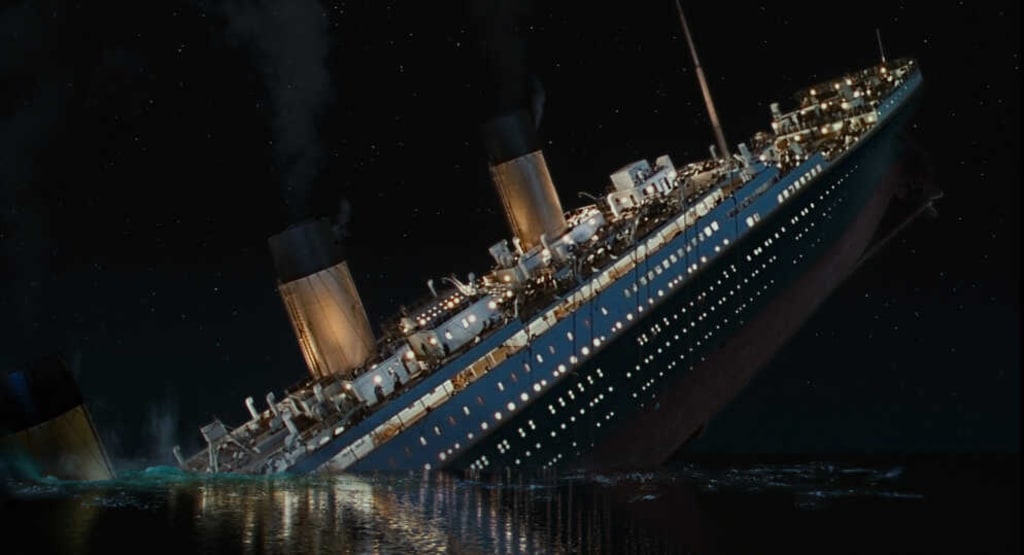
On the night of April 14th to 15th, 1912, the most advanced and supposedly unsinkable ship collided with an iceberg and ultimately sank. The experience was incredibly terrifying – just imagine a colossal cruise ship, several times larger than the Statue of Liberty, crashing into a massive chunk of ice and slowly submerging. The atmosphere was dark and bone-chilling, with nothing but the ominous sounds of metal and wood grinding against each other, surrounded by the icy waters of the endless Atlantic Ocean.
At that moment, there was almost no communication with the outside world, no phones or internet; it was as if the Titanic was isolated from the entire planet. Yet, the most astonishing aspect was the calm exhibited by the passengers on that fateful day during one of the most significant disasters of the 20th century. To understand why they remained composed, you need to see the situation through their eyes:
You are a passenger on the infamous ocean liner, with your cabin located on one of the top decks. You've just enjoyed a splendid dinner with friends, complete with beautiful melodies played by musicians and impeccable service from waiters. Stepping out onto the deck, you soak in the tranquility of the vast ocean, feeling an unparalleled sense of security and comfort. You take pride in being among the first to travel on the world's most advanced ship. As you retire to your cabin, a gentle knock on your door awakens you, and a crew member asks you to go to the deck to investigate an issue. There's no reason to panic; it's just a precaution. You anticipate stargazing on the night sky.
The moment when the Titanic collided with the iceberg felt like nothing more than a slight nudge for some passengers; some didn't even hear it. They only realized something was amiss when stewards knocked on their doors and urged them to go outside. On the deck, passengers remained relatively calm, discussing what might have occurred, listening to conversations around them. They gradually understood that the ship was supposedly sinking, although the idea seemed preposterous. Surely, all passengers would be safely evacuated in lifeboats; after all, it was the "unsinkable" Titanic.
Evacuation commenced, with women and children going first, and there was no pushing or chaos. Men behaved gallantly, assisting crew members in helping women onto lifeboats. Some passengers, surprisingly, didn't want to leave the Titanic, as they believed the ship to be safer than the small, unstable rescue boats.
As flares were launched into the sky, no one paid them much attention; passengers assumed this was standard procedure during a ship breakdown. There was a general belief that a rescue ship was en route to the Titanic, just a few miles away. Some even claimed to see the lights of another ship. Those already in lifeboats preferred to remain close to the Titanic, thinking it safer.
Many passengers simply couldn't fathom that something grave was occurring; they refused to accept that the "unsinkable" ship could sink. It wasn't until the Titanic began tilting forward and its rear part rose above the water that panic started to grip some. Even then, the chaos was relatively minimal.
The orchestra played on, providing a surreal sense of normalcy in the midst of the disaster. At around 2:05 am, the last lifeboat with passengers was lowered, and 15 minutes later, the ship disappeared beneath the waves.
In Morse code, SOS was sent repeatedly, but the Titanic's cries for help seemingly vanished into the night. While other ships were nearby, the call for help went unanswered. It was as if the Northern Lights, a result of geomagnetic storms, played a role in silencing the Titanic's pleas for assistance.
The Earth's magnetosphere, which usually protects us from cosmic dangers, can be affected by geomagnetic storms caused by solar flares. These storms can disrupt navigational and radio equipment, which could have contributed to the Titanic's ill-fated course change.
Navigational equipment, including compasses, can be affected by these storms. The Titanic's advanced radio equipment, intended to work over long distances, experienced issues that night, possibly due to the storm.
Despite the impending disaster, some passengers, like Isidor and Ida Strauss, chose to stay together on the Titanic. Their love story became a symbol of courage and devotion in the face of tragedy. They were among those who didn't make it onto the lifeboats but faced their fate together.
The Titanic's sinking remains a haunting reminder of human behavior in the face of catastrophe, from initial disbelief to the eventual realization of the dire situation.
About the Creator
Ghosy Gan
Passionate writer, crafting words with love. Sharing my written creations is my joy. Join me on this journey as I provide the world with captivating and quality content. Let's explore together!






Comments (1)
A great article, I always love to know more about the Titanic tragedy to find out what would have happened there to the passenger of the ship. I have also watched Titanic movie and it's one of my favorite movies of all time.